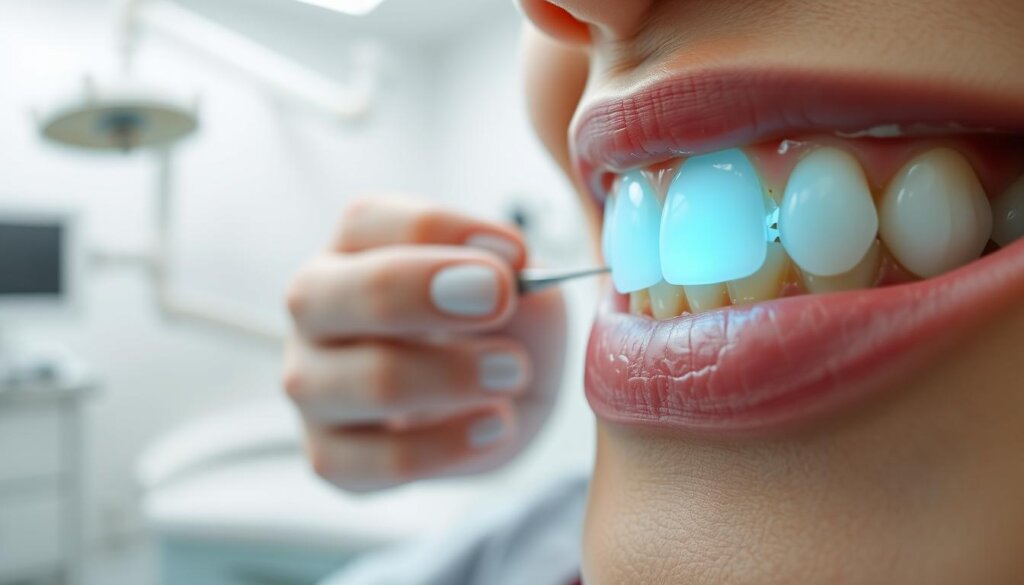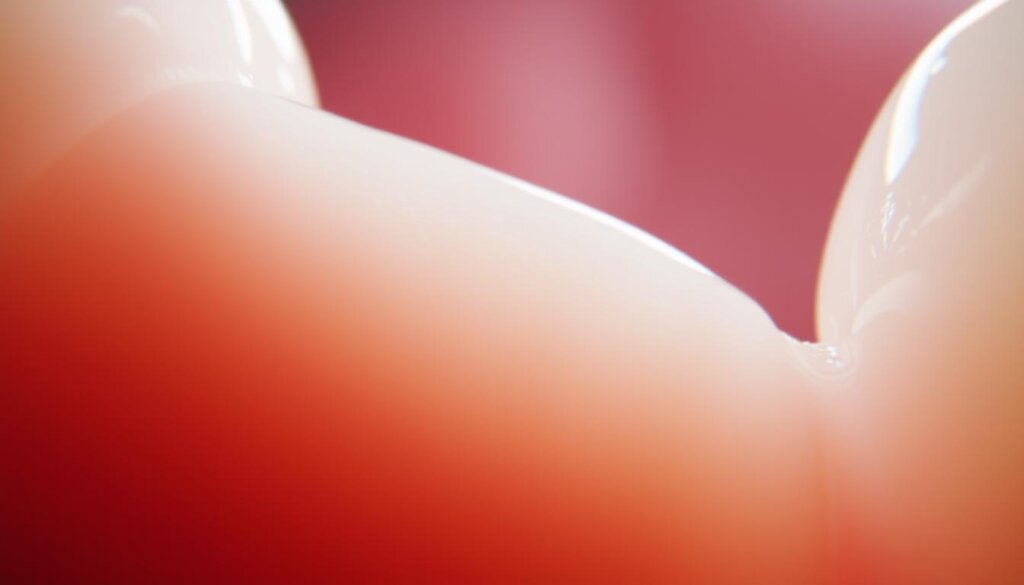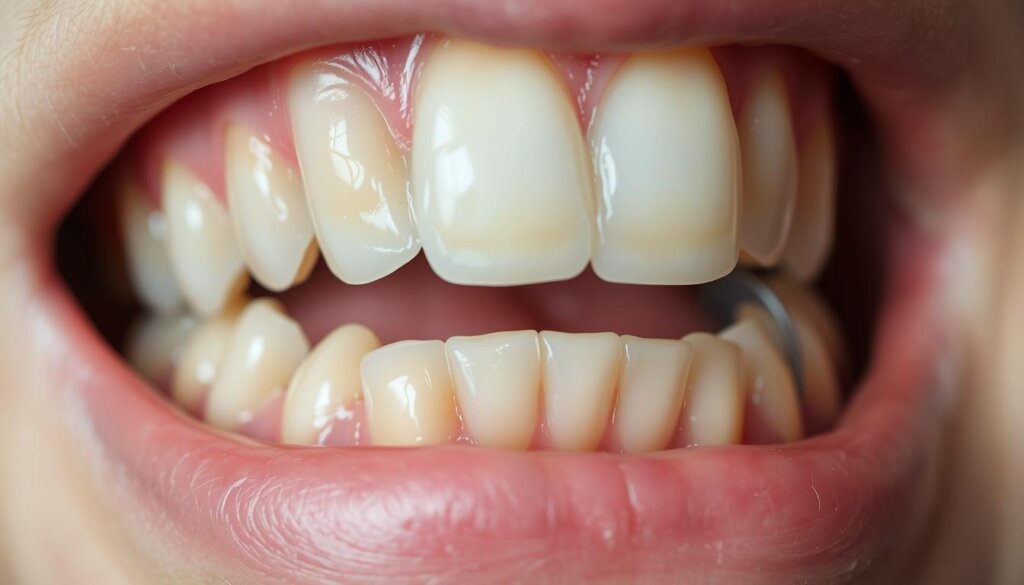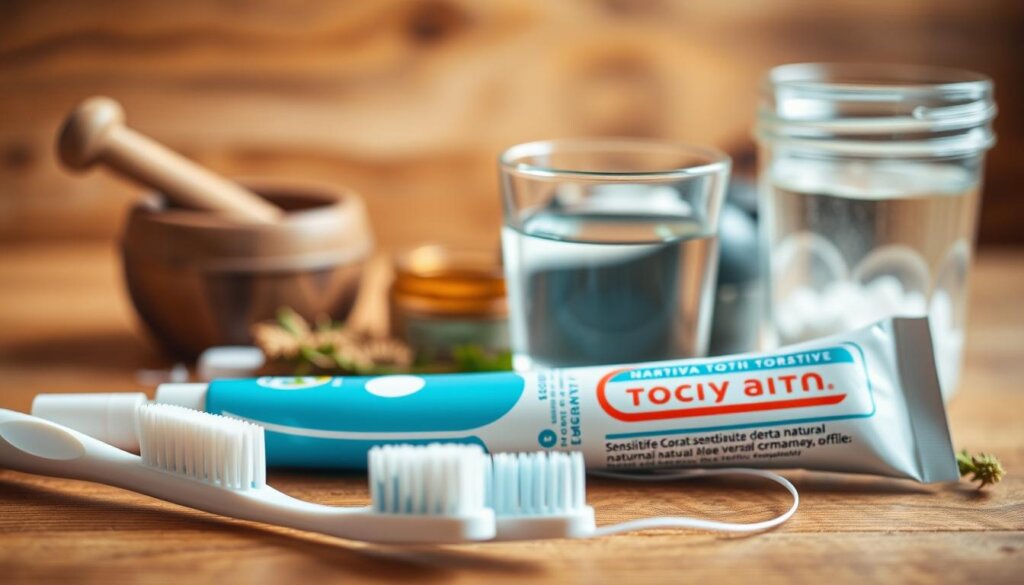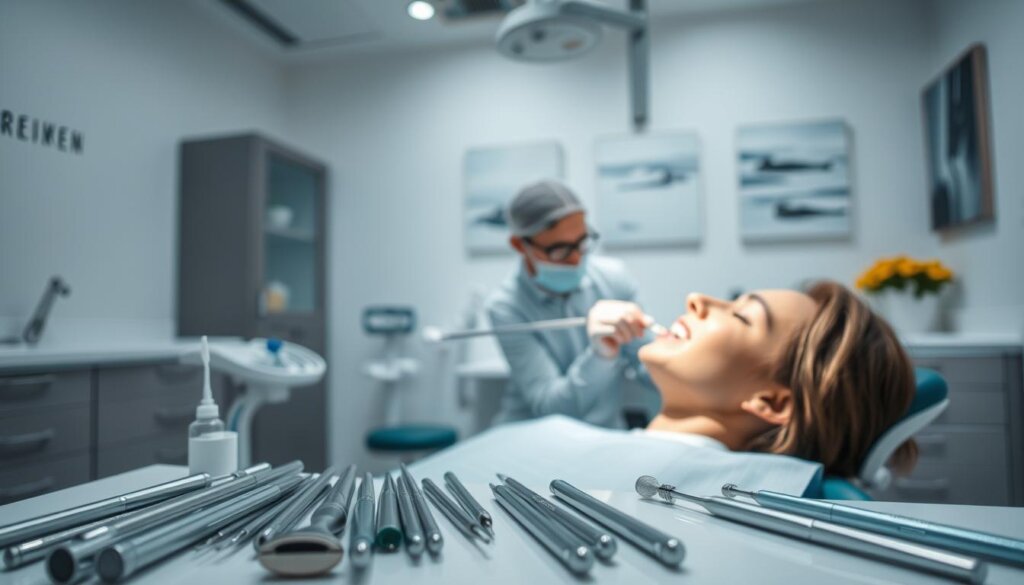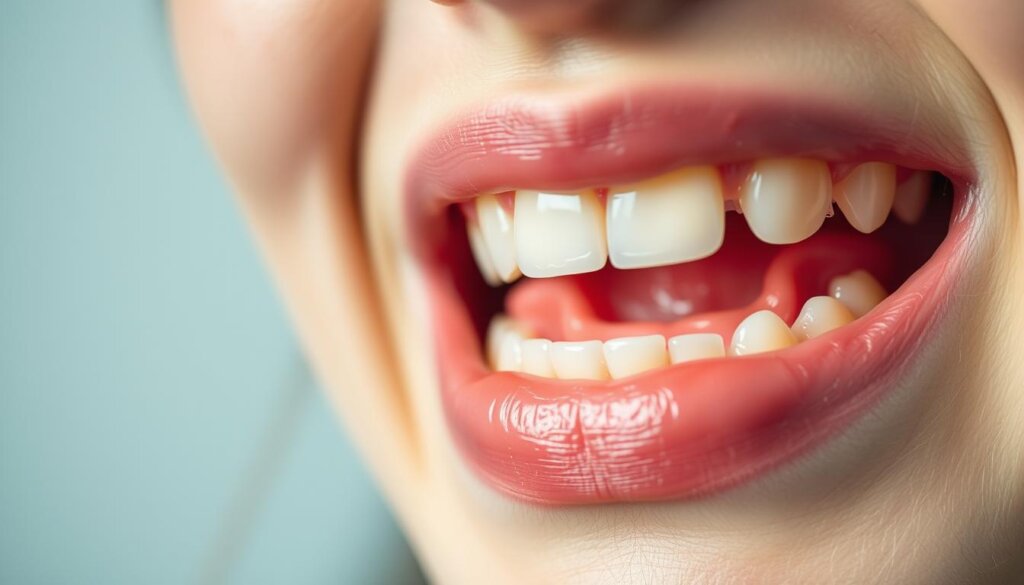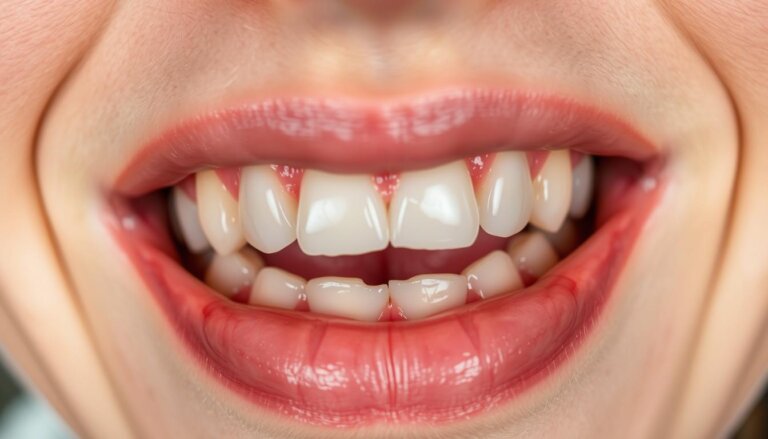Will My Teeth Be Sensitive After a Cleaning?
Have you ever wondered if your teeth will feel sensitive after a dentist visit? You’re not alone. Many think this, but the reality might surprise you.
It’s normal to feel some sensitivity after a cleaning, but it’s usually mild. You might feel sudden discomfort from cold drinks, sweet snacks, or a breath of air. This feeling typically goes away in a few days, hardly ever lasting more than a week.
But why does it happen? Cleaning can expose the softer part of your teeth, especially where the protective layer is thin. This makes your teeth react more to changes in temperature or touch. Also, treatments for gum disease can make your mouth feel sore for a little while.
To lessen discomfort, use a soft toothbrush and try a special toothpaste. Eat foods that aren’t too hot, cold, or acidic. If needed, simple pain relievers can help. If the sensitivity gets worse or lasts more than a week, see your dentist quickly.
In essence, teeth sensitivity after a cleaning doesn’t last long. With the right care, you can manage it well. It shows your teeth are getting the care they need.
Key Takeaways
- Most post-cleaning tooth sensitivity is mild and lasts a few days, often under one week.
- Removing plaque and tartar can expose dentin and tubules, increasing dental cleaning sensitivity temporarily.
- Deep cleanings (scaling and root planing) may cause short-term soreness but are therapeutic for gum disease.
- Soft-bristled brushing, desensitizing toothpaste, and diet tweaks help calm sensitive teeth after cleaning.
- Persistent or worsening pain, swelling, or fever requires prompt dental evaluation.
- People with enamel thinning, gum recession, gingivitis, or periodontitis are more prone to sensitivity.
- Most patients improve with conservative care and return to normal comfort quickly.
Understanding Teeth Sensitivity Post-Cleaning
Many people feel their teeth are more sensitive after getting them cleaned, especially with cold drinks like ice water or coffee. This is common and happens because the cleaning process exposes the surface of your teeth. We want to explain why your teeth might be sensitive after a cleaning and how it’s different from everyday sensitivity.
What Is Teeth Sensitivity?
Teeth sensitivity means feeling a quick, sharp pain from hot, cold, touching, or sweet things. The enamel covers the top part of your teeth, while cementum and healthy gums cover the roots. If these protections get worn down or pull back, tiny tubes in your teeth let signals go through to the nerves.
After cleaning, your teeth might feel more sensitive because the plaque and tartar that used to block these feelings are gone. Even if you didn’t notice much discomfort before, it might pop up now. This kind of sensitivity usually gets better as the tubes close up again and your gums heal.
Common Causes of Sensitivity
Many things can make your teeth sensitive. They all expose the dentin, which makes the nerves in your teeth react more. Knowing these causes can help you understand what to expect after getting your teeth cleaned or having other treatments.
- Enamel erosion caused by acidic foods, fizzy drinks, or acid reflux wears down the protective layer.
- Abrasion from using a hard toothbrush or brushing too hard scrapes away enamel and the cervical area.
- Gum recession due to gum disease or harsh brushing exposes the roots of your teeth.
- Recent dental treatments that remove tartar and plaque, revealing sensitive spots.
- Certain foods and drinks that are cold, acidic, or sugary can trigger a quick pain.
Sensitivity can be more noticeable right after a dental visit if these factors come together. However, most people find that their sensitivity decreases as their mouth heals. This healing is helped by fluoride and taking care of your teeth gently at home, which helps seal the tiny tubes in your teeth.
Why Sensitivity Occurs After Dental Cleanings
After a dental cleaning, patients often feel quick pains or cold shocks. These are common and have clear biological reasons. They happen because of how tools and cleaning materials interact with your teeth and gums.
The Cleaning Process Explored
During a cleaning, dental professionals use scaling to clean above and below the gumline. If needed, they also do deeper cleaning with anesthetics. These treatments can make gums briefly irritated, swollen, or even bleed, especially if there’s gum disease.
This explains why some feel sensitivity after a dental cleaning. The sensitivity usually gets better after a few days, thanks to calming tissues and treatments like fluoride.
How Plaque and Tartar Influence Sensitivity
Plaque and tartar sort of act like a cover over dentin. When removed, your tooth can react more to temperatures and acids. This makes nerves in your teeth more sensitive.
The cleaning also removes protection from special toothpaste. But, things improve as your saliva and treatments work to protect your teeth again. Taking steps to manage this sensitivity helps during this time.
Role of Dental Instruments
Tools like ultrasonic scalers are used to clean teeth, which can make nerves in your teeth react strongly for a short time. Even when used carefully, these sensations might last a day or two.
These tools not only clean but also change how the tooth surface feels. That’s why people might feel sensitivity right after a cleaning. Using certain toothpaste or brushing gently can help manage the sensitivity.
Factors Influencing Sensitivity Levels
Patients react differently to a professional cleaning. The state of their nerves, enamel, and gums plays a big role. This affects if they feel a slight tingle or sharp pains when exposed to cold. Knowing what impacts sensitivity helps us manage it better and make smart choices for dental care.
Individual Pain Thresholds
Everyone feels pain differently. Some might only feel a mild chill from cold water, while others experience a sharp shock. Factors like stress, lack of sleep, and caffeine intake can make teeth more sensitive.
Medications like ibuprofen can dull pain, but anxiety might make it feel worse. These differences can explain why people feel different levels of sensitivity after a dental cleaning.
Pre-existing Dental Conditions
Worn-down enamel can expose dentin, making teeth more sensitive. Small cavities, cracked enamel, and exposed roots also increase sensitivity. Teeth whitening treatments or certain toothpastes can make this worse after a dental visit.
Procedures like scaling can make teeth more sensitive for a few days. Sometimes, removing tartar reveals hidden issues, causing more sensitivity once the dentin is exposed.
Gum Health and Sensitivity
Conditions like gingivitis can make gums very sensitive to temperature and touch. Gum recession reveals root dentin, which is more sensitive because it has no enamel. Hard brushing can make this worse.
Using a soft brush and toothpaste with fluoride can help reduce sensitivity. A good dental care routine is important for healthy gums and managing sensitivity.
Duration of Sensitivity
After dental cleaning, many feel their teeth are more sensitive. This usually gets better as the mouth heals. Following good aftercare tips, the enamel and inner parts of the tooth settle. We want to help you handle sensitivity after cleaning and know what to expect.
Typical Timeframe for Recovery
A regular cleaning might cause discomfort that goes away in two to three days. This is because swelling goes down and the tiny tubes in your teeth close up again. For more intense cleanings, most feel better after about a week. Sticking to aftercare advice helps things get back to normal quicker.
Cold drinks can make your teeth twinge at first. But it should happen less each day. Being gentle with your teeth can prevent sensitivity and problems in that first week.
Factors That Extend Sensitivity
Some things can make recovery take longer. Knowing these can help you care for your teeth better after cleaning.
- Drinking a lot of acidic beverages like citrus juices or sodas can harm enamel, keeping the tiny tubes in your teeth open.
- Brushing too hard or using stiff brushes can wear down enamel and hurt your gums.
- Using rough whitening products can make the insides of your teeth more open, delaying healing.
- If you already have less enamel or your gums have pulled back, more of your tooth is exposed.
- Not noticing other dental issues like cavities or pulpitis can make you think it’s just sensitivity from cleaning.
Sharp pain, feeling heat for a long time, pain that gets worse at night, or pain that just starts on its own could mean a deeper problem. Getting checked out quickly helps make sure you get the right aftercare and treatments to deal with sensitivity after cleaning.
Remedies for Post-Cleaning Sensitivity
After a good polish and scaling, some short-term discomfort can happen. But with the right aftercare, most people feel better soon. The goal is to soothe the nerves, protect the enamel, and avoid things that could trigger more sensitivity.
Home Care Tips
Start using a soft-bristled toothbrush. Brush gently in circular motions at a 45-degree angle to your gums. This helps lessen the wear on sensitive areas and aids in healing.
- Choose lukewarm or room-temperature foods for several days.
- Avoid very hot or cold drinks, and limit acidic or sugary items.
- Use a desensitizing toothpaste twice daily; formulas with potassium nitrate, stannous fluoride, or arginine help block pain signals or seal tubules.
- Rinse with warm salt water: mix 0.5 tsp salt in 8 oz water, swish 15–30 seconds, up to three times daily.
- Pause whitening products until post-cleaning tooth sensitivity settles.
By following these steps, you create a calm environment in your mouth. This is key to handling tooth sensitivity right after cleaning, especially during the first week of healing.
Over-the-Counter Solutions
OTC products can also help when discomfort affects your daily activities. Make sure they fit with your health history.
- Analgesics: ibuprofen or acetaminophen may reduce soreness and inflammation.
- Topical gels with fluoride can bolster enamel and decrease nerve excitability.
- Alcohol-free fluoride rinses support remineralization as part of dental cleaning aftercare.
Using these products for several days can often increase comfort and help stabilize sensitivity after cleaning.
When to Consult a Dentist
If discomfort increases, it’s time to see a dentist. Look for these signs.
- Pain that is severe, worsening, or lasting beyond one week.
- Persistent bleeding, notable swelling, purulence, or fever.
- A new, sharp, localized tooth pain that affects chewing or sleep.
A timely visit to the dentist can prevent serious issues. They can check for infection, cracks, or exposed roots and suggest specific treatments for sensitivity after cleaning.
| Remedy | Primary Benefit | How to Use | Best For |
|---|---|---|---|
| Soft-bristled brushing | Minimizes mechanical irritation | Gentle circles at ~45° to gumline twice daily | Tender gums and exposed dentin |
| Desensitizing toothpaste | Blocks pain signals/seals tubules | Twice daily; do not rinse immediately after | Post-cleaning tooth sensitivity |
| Warm salt-water rinse | Soothes inflamed tissues | 0.5 tsp salt in 8 oz warm water, 15–30 sec, up to 3×/day | Gingival soreness after scaling |
| Fluoride rinse or gel | Supports remineralization | Use nightly; avoid eating for 30 minutes | Enamel softening and acid exposure |
| Ibuprofen or acetaminophen | Reduces pain and inflammation | Follow label; consider medical history and dosing limits | Short-term spikes in sensitivity |
| Pause whitening products | Prevents added nerve stimulation | Hold until symptoms resolve | Dental cleaning aftercare |
Preventing Sensitivity After Dental Cleanings
To lower sensitivity after dental cleanings, start before your appointment. Focus on keeping enamel strong, soothing your gums, and avoiding things that make your mouth sensitive. Doing little things consistently is key.
Importance of Regular Dental Visits
Visiting the dentist every six months is crucial. They can spot issues like worn enamel, gum problems, and tartar build-up early. Catching these early means cleanings can be gentler, reducing sensitivity afterward.
- Schedule periodic exams with bitewing radiographs as indicated.
- Ask for risk-based intervals if you have dry mouth, acid reflux, or orthodontic appliances.
- Discuss professional fluoride varnish to protect exposed dentin during dental cleaning aftercare.
Choosing the Right Toothpaste
Using a toothpaste for sensitive teeth every day can help. It should block tiny holes in your enamel and strengthen it. Choose ingredients like potassium nitrate to ease nerve pain and stannous fluoride to block and rebuild enamel.
- Select a fluoride toothpaste labeled for sensitivity from trusted brands like Colgate, Crest, or Sensodyne.
- Do not rinse right after brushing; let the paste sit for a minute to reduce oral care sensitivity.
- Pair with a soft-bristled brush to avoid abrasion that can amplify dental cleaning sensitivity.
Maintaining Good Oral Hygiene
Brushing gently and keeping a regular routine can minimize plaque and keep your gums healthy. This can prevent inflammation and protect the softer parts of your teeth.
- Brush twice daily with a soft brush using light pressure and short strokes.
- Floss once a day; consider interdental brushes for wider spaces.
- Use an alcohol-free, fluoride mouthwash and chew xylitol gum after meals to support dental cleaning aftercare.
- Limit acidic snacks and drinks; sip water between exposures to control oral care sensitivity.
| Preventive Focus | Action | Benefit |
|---|---|---|
| Early detection | Regular exams and cleanings | Less invasive care and reduced dental cleaning sensitivity |
| Tubule protection | Potassium nitrate and stannous fluoride | Lower oral care sensitivity and stronger enamel |
| Gentle technique | Soft brush, light pressure, proper angles | Prevents abrasion, recession, and post-cleaning flare |
| Biofilm control | Twice-daily brushing, daily flossing, mouthwash | Smoother cleanings and easier dental cleaning aftercare |
| Acid management | Reduce acidic foods; water rinse after intake | Protects enamel and limits sensitivity triggers |
When to Be Concerned About Sensitivity
Many people feel quick dental discomfort after a teeth cleaning. This is usually because of changes in temperature or after consuming sweet beverages. It normally gets better in a few days. But if your teeth feel more sensitive than usual after a cleaning, pay attention to that change.
How long does it last, how strong is it, and what else is happening? Asking these questions can help you figure out if the sensitivity is normal. Or it could mean something that needs a dentist’s attention.
Signs That Indicate a Problem
- Severe pain, pain that worsens over time, or pain that persists beyond one week.
- Gums that bleed a lot, look very red, feel swollen, or warm.
- Any yellowish liquid at the gumline or between teeth, or a fever.
- Sharp pain in one tooth, especially when you bite or chew.
- Pain that gets worse when you lie down or that wakes you up.
- Sensitivity to hot things that doesn’t go away quickly.
Symptoms like these might mean a more serious dental issue. Catching them early can prevent bigger problems and save your teeth.
Differentiating Between Normal and Severe Sensitivity
Normal tooth sensitivity after cleaning feels mild to moderate. It’s usually due to cold things or sweets and gets better with each day. Many teeth may feel this way, but special toothpaste can help.
- Duration: Normal sensitivity goes away in a few days; lasting pain is unusual.
- Intensity: A quick discomfort is common; pain that gets worse is a red flag.
- Association: Fever or signs of infection like swelling signify a more serious issue.
Keeping track of what causes your sensitivity and how severe it is can help doctors. Places like the University of Michigan School of Dentistry or Mayo Clinic Dental Specialties use this info to give the right treatment. Noting down details about your dental sensitivity could even avoid more intense treatments later.
Professional Advice for Managing Sensitivity
After a dental cleaning, some patients feel sharp pains from cold air or sweet drinks. Experts show how to care for teeth after cleaning. They focus on keeping enamel and gums healthy. They aim to make dental care less painful while keeping teeth working right.
Consulting with Your Dentist
A quick check-up can tell if the pain is normal or something serious. Dentists might use fluoride treatments to help the teeth. They also talk about how to brush and what tools and rinses to use for better care after cleaning.
It helps when patients get simple steps to follow. What can you do right now to avoid pain? What habits are good for your teeth and gums this week? This talk makes it easy to keep teeth from hurting after a cleaning.
Tailored Treatment Plans
Plans are made to fit each person’s needs. They might include special toothpastes, advice on eating less acidic foods, and tips on brushing gently. If there’s a lot of plaque, dentists might clean teeth in stages. This helps avoid pain after the cleaning.
- In-office desensitizers: fluoride varnish, calcium-phosphate pastes
- Technique modification: lighter grip, shorter strokes, timed brushing
- Behavioral supports: nightguard discussion for clenching or grinding
- Targeted rinses: alcohol-free, fluoride-containing formulations
Importance of Follow-Up Visits
Check-ups make sure healing is on track after deep cleaning. If pain lasts too long, dentists will look for other issues. Regular visits help keep aftercare right and adjust the plan as needed.
Going back to the dentist often helps keep teeth from getting sensitive again. This ensures comfort in the long run.
The Role of Toothpaste and Oral Care Products
Many patients feel quick zings of pain after cleaning. The right routine can improve this sensitivity. Choosing the correct toothpaste and tools protects enamel and soothes exposed dentin. These steps make tooth sensitivity better after a cleaning without slowing healing.
Sensitive Teeth Toothpaste Benefits
Desensitizing toothpaste works in two key ways. First, they block dentinal tubules or calm nerve signals. Potassium nitrate lowers nerve excitability. Stannous fluoride creates protective barriers and fights microbes.
Arginine mixes help seal tubules, which helps with comfort. Use a pea-sized amount twice a day and don’t rinse for 30 minutes. This builds a barrier for sensitivity relief. Wait to use whitening pastes, as they can be rough, until your symptoms improve.
- Brush with a soft-bristled brush to protect exposed areas.
- Choose low-abrasion pastes to keep new enamel safe.
- Put paste on sensitive teeth with your fingertip before sleeping.
Importance of Fluoride
Fluoride makes enamel stronger and seals open tubules. Using it in toothpaste every day helps fix tooth sensitivity after cleaning. Professional gels or varnishes offer extra fluoride when needed. It’s more about regular use than using a lot at once.
Look for toothpaste with 1,000–1,500 ppm fluoride for home unless your dentist says otherwise. Also, brush gently and use a non-alcohol mouthrinse. This helps keep the protective layer formed during early healing.
| Active Ingredient | Primary Mechanism | Typical Benefit Timeline | Best For | Clinical Notes |
|---|---|---|---|---|
| Potassium Nitrate | Nerve desensitization | 1–2 weeks with twice-daily use | Cold-triggered zingers | Leave-on contact improves effect; avoid rinsing immediately |
| Stannous Fluoride | Tubule occlusion + antimicrobial | Several days to 2 weeks | Post-scaling sensitivity and gingival inflammation | May stain lightly; brushing technique reduces deposits |
| Arginine-Calcium Carbonate | Promotes physical tubule sealing | Often within days | Exposed root surfaces | Pairs well with soft bristles and low-abrasive pastes |
| Sodium Fluoride | Enamel remineralization | Progressive with daily use | Erosion or abrasion-prone enamel | Consider in-office varnish for rapid reinforcement |
- Avoid harsh whitening pastes while recovering to reduce pain.
- Choose alcohol-free rinses to keep tissues moist and reduce sensitivity.
- Talk to your dentist about varnish or gel if needed.
These choices help you comfortably heal by matching daily habits with your body’s needs. The result? A routine that heals while keeping enamel strong and nerves calm.
Eating and Drinking After a Cleaning
Right after getting your teeth cleaned, choosing what you eat and drink carefully helps a lot. Your teeth may feel extra clean, but the sensitive parts might respond more to hot, cold, or sour things. Picking the right meals and drinks can ease tooth sensitivity and not mess with your day.
What helps most in the first 24 hours? Go for warm things, eat soft foods, and let your saliva naturaly protect your teeth. These steps help minimize sensitivity as your teeth start to recover.
Foods to Avoid for Sensitive Teeth
- Don’t have things too hot or cold: stay away from ice water, frozen desserts, or very hot soups to avoid discomfort.
- Avoid acidic foods: say no to citrusy drinks, sports drinks, vinegary sauces, and sodas to protect your enamel.
- Skip sugary and sticky sweets: they can make sensitivity worse after a cleaning.
- Avoid alcohol and teeth whitening products: they can irritate your gums and slow down the healing.
- Choose soft, mildly warm foods like oatmeal, yogurt, ripe bananas, scrambled eggs, and steamed veggies to ease chewing.
- If you can’t avoid sweet or acidic foods, have them less often and rinse with water afterwards to help.
Hydration During Recovery
Room temperature water is best. It helps keep your saliva working, cleans away acids, and helps form a protective layer on your teeth. Avoid bubbly or flavored waters that are acidic while your teeth are sensitive.
- Take small sips often to keep your mouth working right.
- Gently rinse after eating or drinking acidic or sugary things.
- Wait on ice-cold drinks until your teeth feel better.
When your teeth start feeling better, you can slowly start eating harder foods again. Stay hydrated and choose foods that are easy on your teeth to keep healing well.
Children’s Sensitivity After Cleanings
Many kids feel a quick tingle or zing after a dental cleaning. This is often because plaque was removed from sore gums. It might expose the tooth’s porous enamel too. Our team keeps an eye on sensitivity from dental hygiene and helps families keep routine care comfortable.
Why does this happen? Tartar removal can make tiny channels in the teeth react to air or cold. Diet matters too. Juices and sports drinks have acids that can make teeth more sensitive right after a cleaning.
Children’s Unique Oral Health Needs
Kid’s enamel is thinner than adults’, so they feel things more quickly. If their gums are swollen from plaque, cleaning those areas might make them extra sensitive.
- Gentle instrumentation: Special tools and gentle touch during cleaning protect kids’ teeth and gums.
- Age-appropriate coaching: Simple instructions like “small circles, soft hands” help avoid brushing too hard.
- Diet awareness: Avoiding acidic drinks right after cleanings can lessen sensitivity.
Strategies for Parents
Make cleaning day stress-free. Encourage drinking water and eating warm foods. If your child mentions sensitivity, avoid giving them very cold drinks for a day.
- Choose a soft toothbrush and show them how to brush gently.
- Pick the right fluoride toothpaste amount: a rice size for little ones, pea size for older kids.
- Cut down on acid drinks and sticky candy when it’s close to dental visits.
- If sensitivity stays, think about using a special toothpaste for kids. Always check with a dentist first.
- Watch out if sensitivity lasts, or if there’s swelling or sharp pain. If so, see a dentist right away.
The Impact of Whitening Treatments
Whitening treatments can change how your teeth feel, especially after a dental cleaning. Exposed areas can make your mouth more sensitive. It’s smart to plan your whitening to avoid discomfort but still get great results.
Sensitivity from Whitening Products
Peroxide gels can pull fluid from your enamel, making your teeth more sensitive. This usually lasts a day or two. If your teeth were cleaned recently, they might feel even more sensitive.
To reduce pain, wait a few days after cleaning to use products like Philips Zoom. Stop using harsh toothpastes for a while. Ask about products that can help with sensitivity, like high-fluoride varnishes.
- Reduce how long you use trays and watch for changes.
- Brush gently with a soft brush and lukewarm water.
- Use toothpaste for sensitive teeth twice a day between treatments.
Alternatives to Traditional Whitening
If you have sensitive teeth, there are gentler options. Use milder gels or space out your treatments. Adding a desensitizer can make things more comfortable.
There are also non-bleaching ways to make your teeth brighter. Your dentist can use special pastes or varnishes. You might also try a whitening plan that mixes home care with professional help for better comfort.
Long-term Sensitivity Consequences
Most patients expect their teeth to feel better a few days after cleaning. But if discomfort remains, it could mean deeper issues. Spotting these signs early helps deal with tooth sensitivity and keeps teeth healthy for a long time.
Chronic Sensitivity and Its Causes
Chronic pain can start when a cleaning reveals exposed dentin. Drinks like soda or acidic juices, and even stomach acid, can wear down enamel. This makes nerves more sensitive.
Too-hard brushing or the wrong brushing can damage teeth. Gum disease or too much flossing exposes roots. And stress-related teeth grinding can cause tiny cracks. These problems can make eating painful and hide other dental issues.
Dental pain that doesn’t go away, like sharp pain from cold or when you bite, needs quick attention. This helps spot and treat issues early on.
Preventative Measures for Long-term Care
Dealing with tooth sensitivity means caring for your teeth every day with the right tools. Use a toothbrush with soft bristles and gentle paste to keep your enamel safe.
- Use a desensitizing fluoride toothpaste with potassium nitrate or stannous fluoride twice daily.
- Request professional fluoride varnish or gel applications at recall visits.
- Limit acidic exposures; sip water between acidic foods and wait 30 minutes before brushing.
- Adopt a night guard for bruxism after a clinical evaluation.
- Schedule regular checkups so clinicians can track enamel wear and recession trends.
If tooth sensitivity doesn’t improve after cleaning, a dentist might look for signs of nerve damage. Following their advice can help reduce sensitivity and keep your teeth healthy.
Communicating with Your Dental Care Provider
Clear communication makes routine visits better. You might wonder, “Will my teeth be sensitive after cleaning?” A quick chat can connect symptoms to their causes. It also matches home care with what the clinic suggests.
Questions to Ask Post-Cleaning
- Is my post-cleaning tooth sensitivity normal, or is it from enamel wear or gum recession?
- Which desensitizing toothpaste and fluoride routine is best for me, and for how long?
- When can I safely whiten my teeth again to avoid more sensitivity?
- What brushing method and brush type are best for my gums and exposed dentin?
- Should I change my diet to avoid acidic foods like citrus, sparkling water, or vinegar?
- How long will recovery take, and when should I reach out if my symptoms get worse or don’t go away?
Asking these questions changes, “Will my teeth be sensitive after a cleaning?” into a plan. This plan helps with daily routines, protective treatments, and when to check back in.
Importance of Sharing Your Concerns
Tell your dentist about any pain, past sensitivity, and factors like acidic food, teeth grinding, or hard brushing. This information helps them adjust their methods. Like doing softer polishing, careful scaling, and choosing when to apply fluoride during your cleaning.
- Talk about any gum recession, cracked teeth, or recent whitening that might make your teeth more sensitive after cleaning.
- Mention any medicines you take that dry out your mouth. A dry mouth can make sensitivity worse.
- Decide on how long to watch for problems and when you should call if things aren’t getting better.
When you talk openly, the dental team can customize your care. They can set times to check in and change how you take care of your teeth at home. This makes answering, “Will my teeth be sensitive after a cleaning?” clearer and more specific to you.
The Psychological Aspect of Dental Sensitivity
Stress affects how our brain reads signals from our teeth and gums. When we’re stressed, even normal feelings after a cleaning can seem more intense and last longer. Knowing what to expect for recovery—usually a few days to a week—can help lessen fear and make managing sensitivity easier.
Anxiety and Sensitivity Perception
Being anxious makes the nervous system more alert. Then, cold air, sweet stuff, or pressure might feel like pain. This happens a lot with dental care and often starts after treatments like scaling or polishing. Knowing what’s normal and what’s not can help reduce how threatening it feels.
- Timeline framing: Expect brief zings for the first 24–72 hours, calming down within a week.
- Red flags: Pain that gets worse, swelling, fever, or constant throbbing means you should see a dentist quickly.
- Breath pacing: Breathing slowly through your nose for a minute before and after brushing helps ease tension.
Keeping track of your experience helps. Write down what causes discomfort, how long it lasts, and what eases it. Keeping a record helps you manage tooth sensitivity by spotting patterns and making specific changes.
Coping Mechanisms for Patients
To deal with sensitivity well, mix science with routine. Choose a toothbrush with soft bristles, use gentle pressure, and brush softly. Also, eat or drink cold items when your mouth is less sensitive. These steps help lower discomfort while keeping your daily routine intact.
- Brush with a desensitizing toothpaste containing potassium nitrate twice a day; avoid rinsing for 30 minutes.
- At night, use a fluoride mouthwash to strengthen enamel and soothe the nerves in your teeth.
- If needed, take over-the-counter ibuprofen or acetaminophen as the instructions suggest for short-term relief.
- Keep track of how you feel for a week to see if there’s improvement in your tooth sensitivity.
- If you start feeling more anxious or your symptoms aren’t what you expected, make a quick appointment with your dentist.
For those with severe dental care sensitivity, combining at-home practices with quick reassurance from your dentist can help adjust what you expect. Understanding what’s normal and what’s not helps lessen anxiety. It also makes recovery seem more within your control.
Conclusion: Understanding Your Teeth’s Response
Many readers wonder if their teeth will feel sensitive after a cleaning. It’s normal to have mild responses as we remove plaque and tartar. Our goal is to explain what this sensitivity is like and how to help recovery.
Recap of Key Points
- Most sensitivity after cleaning goes away in a few days; deeper cleanings might take up to a week.
- Things like cold or hot drinks, sweets, and air can trigger sensitivity.
- This happens because cleaning opens up tiny tubes in your teeth and can make gums temporarily inflamed.
- Risks include wearing down enamel, brushing too hard, gums pulling back, and using whitening products a lot.
Caring for your teeth after cleaning is key. Using special toothpaste can help calm nerve reactions. Brush gently with soft bristles, rinse with warm salt water, and avoid things that trigger sensitivity to heal better.
| Trigger/Factor | Typical Sensation | What Helps | Clinical Rationale |
|---|---|---|---|
| Cold drinks | Quick, sharp zing | Use desensitizing paste nightly | Blocks tubules to reduce fluid movement |
| Hot beverages | Dull ache that eases | Let drinks cool; sip through a straw | Limits thermal shock to exposed dentin |
| Sweets | Brief stinging | Rinse with water after intake | Clears osmotic irritants from surfaces |
| Air exposure | Short, sharp twinge | Close lips when outside in wind | Reduces evaporative cooling on teeth |
| Abrasive brushing | Ongoing edge sensitivity | Adopt soft bristles; gentle pressure | Prevents further enamel and gum wear |
| Recent whitening | Heightened response to cold | Pause bleaching for several days | Allows enamel pores to rehydrate |
| Deep scaling | Tender gums, cold sensitivity | Warm salt-water rinses twice daily | Calms tissues and aids circulation |
Encouragement for Dental Care
Sensitivity after cleaning should not stop you from regular dental visits. Routine care protects your teeth and keeps gums healthy. If pain gets bad or if you see swelling or fever, see a dentist right away.
Following advice at home and seeing your dentist regularly can make sensitivity manageable and short. This way, you can focus on keeping your mouth healthy and feeling good.
Additional Resources for Dental Health
Patients and doctors use reliable guides to make smart choices after dental cleanings. The American Dental Association has clinical protocols. The Centers for Disease Control and Prevention share ways to prevent dental problems in communities and clinics. These help ensure safety, cut down on discomfort after cleaning, and improve dental health for all ages.
Trusted Websites and Organizations
The ADA shares expert advice on treating sensitive teeth, using fluoride, and applying sealants. The CDC’s Oral Health site talks about how to avoid risks, control infections, and put fluoride in community water. They teach soft cleaning methods, how to use fluoride to strengthen teeth, and the right way to use products for sensitive teeth. Plus, they recommend eating right and spotting early warning signs that need a dentist’s look.
Importance of Ongoing Education
Keeping up with new studies lets dental teams give better care and reduce discomfort. Continuous learning leads to good advice for patients, better use of tools, and gentle polishing to protect teeth. This method helps manage sensitivity after cleaning, using home tips, smart sorting of cases, and knowing when to refer someone.
Daily learning helps connect everyday actions to lasting dental health. Following tested methods—like fluoride treatments, gentle cleaning pastes, and careful desensitizing—leads to easier care after cleanings and less discomfort. It means patients are more comfortable, follow advice better, and their teeth stay strong.

